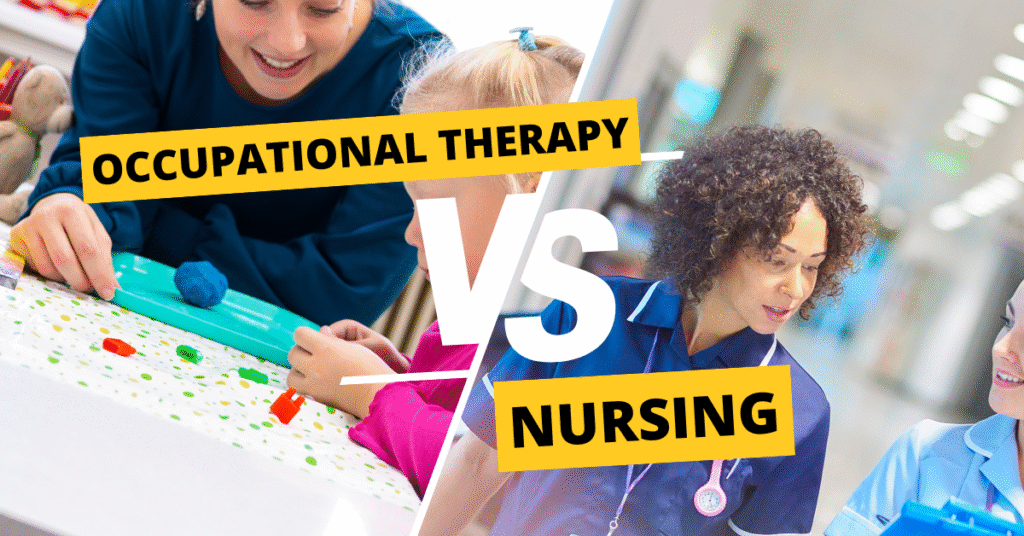Choosing a healthcare career is a big decision, and for many, the choice comes down to two meaningful paths: Occupational Therapy (OT) or Nursing. Both professions offer the chance to make a real impact—but which one is harder? That depends on how you define “hard.”
Rather than giving a one-size-fits-all answer, this article explores the key differences between the two in terms of education, work settings, job demands, and skill sets. This should help you decide which path aligns best with your strengths and interests.
Educational Pathways
Nursing:
To become a registered nurse (RN), students typically complete a Bachelor of Nursing or Diploma of Nursing. Programs include anatomy, physiology, pharmacology, and clinical placements in hospitals or aged care facilities. After graduating, nurses must pass licensing exams such as the NCLEX (US) or meet local registration requirements (e.g. AHPRA in Australia).
Occupational Therapy:
Occupational therapists usually complete a Bachelor of Occupational Therapy or a related Master’s degree. OT students study neuroscience, psychology, rehabilitation, anatomy, and therapy techniques, and also complete supervised clinical placements.
In short:
- Nursing tends to have a more clinical/medical focus.
- OT focuses more on functional rehabilitation and psychosocial care.
Both are academically demanding but in different ways.
Daily Responsibilities
What Nurses Do:
Nurses are often the backbone of patient care. Tasks can include:
- Administering medication
- Monitoring vital signs
- Assisting with hygiene or wound care
- Coordinating with doctors and specialists
- Supporting patients during acute illness or recovery
They often work in high-pressure environments such as hospitals, ICUs, or emergency rooms.
What Occupational Therapists Do:
OTs focus on helping people regain independence in daily life. Their duties include:
- Assessing physical, sensory, or cognitive challenges
- Designing personalised rehabilitation plans
- Teaching skills for dressing, cooking, or driving
- Recommending adaptive equipment
- Working in settings like schools, homes, or rehab clinics
They often deal with long-term conditions, mental health, or developmental delays.
Bottom line:
Nurses often work in fast-paced medical settings, while OTs work more one-on-one on long-term progress and function.
Workload and Emotional Demands
Nursing:
- Shift work (nights, weekends, holidays) is common
- High patient loads and physical demands
- Exposure to life-and-death situations
- Emotionally intense, especially in acute or trauma settings
Occupational Therapy:
- More regular business hours (especially in private practice)
- Emotionally involved but generally less crisis-driven
- Focused on problem-solving and collaboration
- May involve travel to schools, homes, or clinics
Some people find the pace of nursing more intense, while others may find the complex case management in OT more mentally challenging.
Job Satisfaction and Career Growth
Both fields offer meaningful work and strong job prospects.
- Nursing provides a clear clinical career ladder: nurse practitioner, nurse educator, nurse unit manager, etc.
- Occupational Therapy offers options in clinical specialisation (e.g. paediatrics, neuro rehab, aged care), teaching, or private practice.
Job satisfaction tends to be high in both fields, especially when working in preferred environments and with supportive teams.
Which One Is Harder?
There’s no definitive answer—it depends on you.
- If you enjoy fast-paced clinical environments, handling emergencies, and direct patient care, nursing might be a better fit.
- If you prefer a holistic, one-on-one approach to helping people gain independence and thrive in daily life, occupational therapy may be more rewarding.
Both careers are demanding, valuable, and require dedication, just in different ways.
Final Thoughts
The real question isn’t which job is harder—but which one is right for you. Nursing and occupational therapy each play essential roles in healthcare. Whether you’re drawn to the immediate care and urgency of nursing or the creative, problem-solving nature of OT, both offer meaningful and respected career paths.
Take the time to reflect on your personality, learning style, and career goals. The better fit will feel less like “hard work” and more like purposeful effort.



